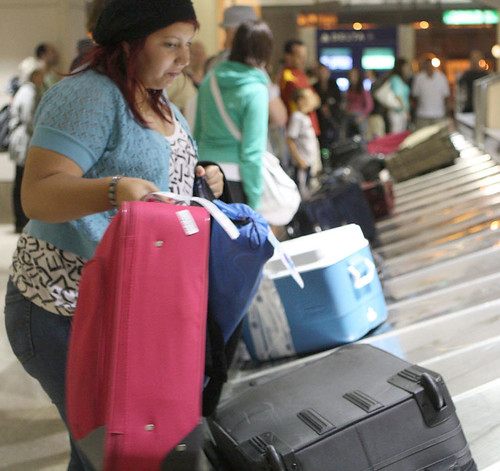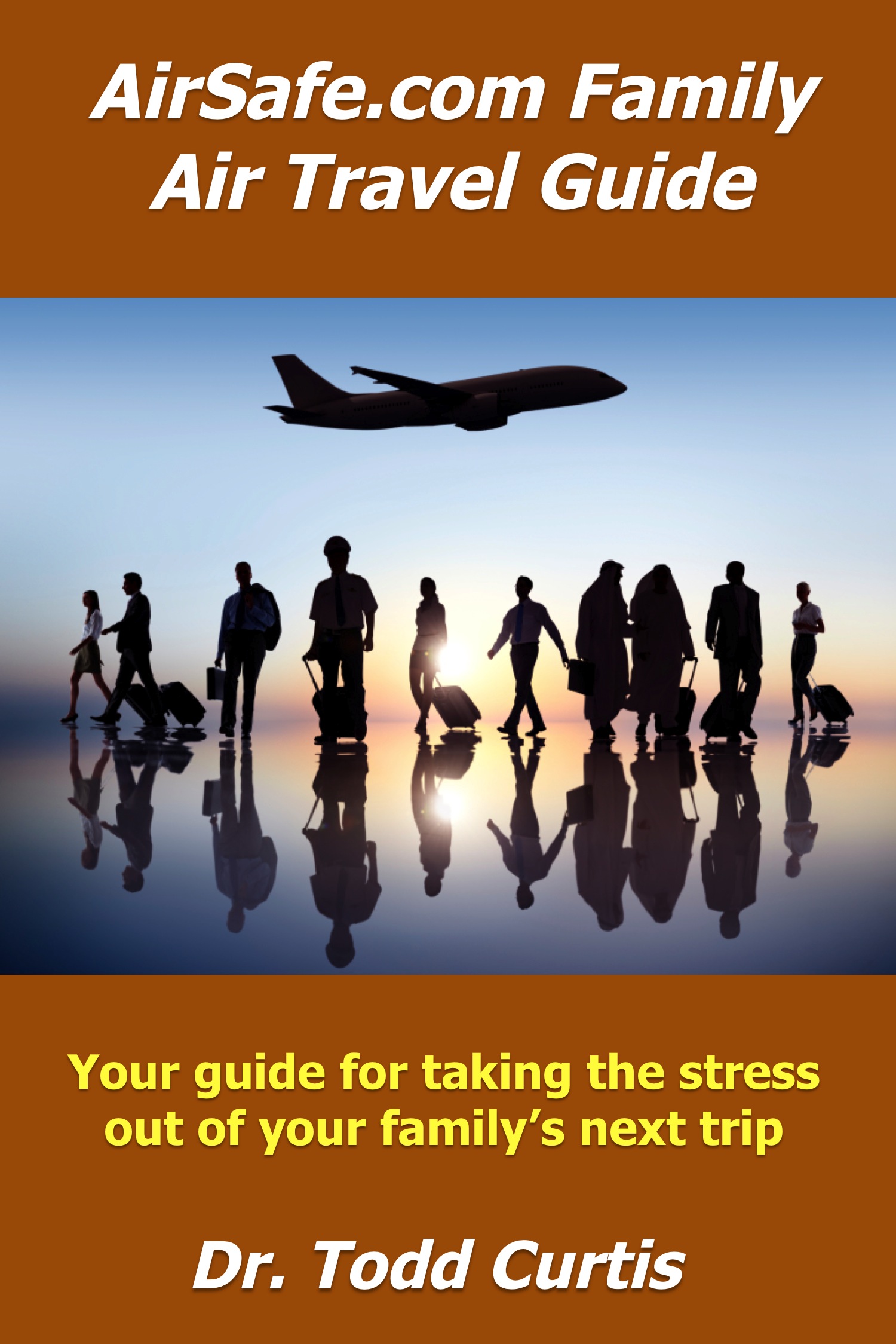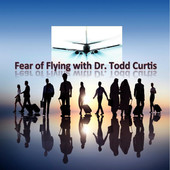Once again, the holidays mark one of the busier travel times of the year, with much of it personal travel as family and friends take to the skies. As with every holiday season, many of the same issues come up again and again, but in the past few months AirSafe.com has added a number of resources to help you deal with some of the uncertainty and stress.
The two biggest changes include the recent release of the
AirSafe.com Baggage and Security Guide, with dozens of articles on dealing with security, baggage, unaccompanied children, and other concerns. It is free and available as a PDF download, or as a MOBI or EPUB file that you can read in your Kindle, Nook, or iPad.
For those who are are a bit anxious about flying, AirSafe.com has teamed up with the SOAR fear of flying organization to offer advice, information, and other resources for fearful flyers.
Download AirSafe.com's fear of flying resources guide for more information.

Much of the advice AirSafe.com has for passengers traveling this time of year hasn't changed all that much, but below we have included some of the issues that many passengers are likely to face, from missed connections and lost baggage to having some of your carry on items confiscated by airport security. Please review the following pieces of advice, you may find something that will help you avoid problems, or help you deal with them should they happen to you.
Get to the Airport EarlyAssume that getting to the airport, parking, going through check in, and going through security lines will take longer than usual. Arrive early, and do what you can to avoid delays. If you are only taking carry-on bags, print out your boarding pass before getting to the airport and go straight to the security gate.
Keep Track of Any Flight ChangesA day or two before your trip, check with your airline to see if your flight's schedule has changed. If you can, sign up for phone, email, or text messaging alerts from your airline to find out about any last minute changes to your schedule. Keep your cell phone with you and have the airline's customer service or reservations number handy just in case you run into problems and have to call the airline directly.
Identification
In the US, the Transportation Security Administration (TSA) requires travelers over the age of 18 to have some sort of photo identification issued by a state, local, or national government agency. This would include driver's licenses, passports, and military ID cards but would not include student ID cards or employee ID badges.
If you do not have these kinds of IDs, you may be able to present alternative documentation to the TSA. Non-US/Canadian citizens are not required to carry their passports if they have documents issued by the U.S. government such as Permanent Resident Cards. Those who do not should carry their passports for domestic US travel.
For more identification advice, including more details on IDs the TSA finds acceptable, and what to do if you can't find your ID, download the AirSafe.com Baggage and Security Guide.
Checkpoints
Depending on the level of security in place when you are at the airport, the security agents may insist on searching every bag, package, and suitcase. Be prepared by arriving at the airport at least a half hour earlier than usual. One recent change in TSA is good news for many parents. Children under 12 are no longer required to remove their shoes to go through the screening area.
Flying with Holiday Food
During the Thanksgiving and Christmas holidays, traveling with food is fairly common. You should be aware that some food items are banned from carry on baggage because they contain liquids or gels. While you can carry cakes, pastries, and pies with you in your carry on bag, but the following should either be in checked baggage or left at home:
- Cranberry sauce
- Creamy dips and spreads (cheeses, peanut butter, etc.)
- Gravy
- Jams, jellies, and syrup
- Oils and vinegars
- Salad dressing
- Salsa
- Sauces
- Soups
- Wine, liquor and beer
- Gift baskets with one or more of the above items
Note on gels and liquids: There are exceptions for small amounts of gels, liquids, and aerosols, and more generous exceptions for medically related items, but for most items in containers over 3.4 oz. (100 ml), if you can pour it, pump it, squeeze it, spread it, smear it, spray it, or or spill it, you probably can't carry it in your carry on. Snow globes of any size are also not allowed in your carry on. Visit AirSafe.com to find out what you are not allowed to take on an airplane.
Note on fruit cakes: In virtually all cases, fruit cakes (even those made with loving care by close relatives) should be dealt with long before you get to the airport. Some prefer giving them away, but discreetly tossing them out when no one is looking is often the preferred method.
Duty Free ItemsIf you are traveling to or from the US, you should make sure that you don't run into problems with duty free liquids like alcohol, perfume, and cosmetics. AirSafe.com provides detailed advice on
how to deal with these kinds of duty free items.
GiftsIf you carry gifts, either in checked or carry-on baggage, remember that the TSA has to be able to inspect any package and may have to unwrap your gift to do so. You can partially unwrap them for easier access, ship wrapped gifts ahead of time, or wait until you arrive at your destination to wrap them.
 Baggage Issues
Baggage IssuesThere are three baggage issues that become important during the holidays. The first is that most US airlines are charging you for every checked bag, so using carry-ons only will save you some money. Second, if you do check one or more bags, be prepared to deal with a lost, stolen, or damaged bag. That means if it is valuable to you and you can't deal with having it lost or stolen, keep it with you on your person or in your carry-on bag. That includes things like money, jewelry, medicine, passports, eyeglasses, and laptop computers.
The third potential problem is that if there is no space in the overhead bins, you may be forced to have your carry-on bag checked. If this happens, be prepared to take out any valuables from your carry on before a cabin crew member or a gate agent takes it away.
Unaccompanied ChildrenIf you have a child who will be traveling alone, you should be aware of your airline's specific rules on this kind of travel. AirSafe.com has
detailed advice on travel by unaccompanied children, including having the child carry a copy of all contact information and if the child is old enough, a working cell phone. Brent, a flight attendant with a major US airline, wrote to AirSafe.com and offered the following additional advice:
I liked that you suggest having the unaccompanied minor carry a copy of all contact information. One issue I run into is illegible handwriting on the form we use that stays with the child. This form is filled out by hand by the guardian of the child when they present the unaccompanied minor for the flight.
Although the agent who accepts the child and inputs the information in to the computer should check for legibility, this is often not done. Flight attendants don't have access to any information on the company's computer system while on board the aircraft, so we must try to make out poor hand writing in the event we must contact the adult listed. It seems like a minor issue. But when you are on board an aircraft we must be able to effectively utilize the few resources we have.
Also, as you mentioned, cell phones for unaccompanied minors are a very good idea. I don't have any problem contacting an adult for an unaccompanied minor from my cell phone in the event of a delay. However, this might be more than some flight attendants are willing to do. It also opens the flight attendant up to sharing personal phone contact information with a stranger that some flight attendants might not be comfortable with that.
A child with a properly charged cell phone and contact information can be very helpful. This often helps to calm the nerves of the child's parent or guardian and the child because of the separation. A quick chat on the phone with a responsible adult representative of the airline who is on board the child's flight can make all the difference when it comes to peace of mind. I have heard the relief in many parents and grandparents voices.
ResourcesGeneral Baggage IssuesCarry-on Bag IssuesTravel by Unaccompanied ChildrenTop 10 Tips for Children Traveling AloneWhat You Are Not Allowed to Take on an Airplane.AirSafe.com Baggage and Security GuideAirSafe.com's fear of flying resources guidePhotos: Eileen Mansoorian, TSA

 This new book from Dr. Todd Curtis of AirSafe.com provides parents who fly with children and children who fly alone with advice on how to avoid many of the difficult situations faced by families that travel, and also provides numerous tips on how to take the stress out of your next trip.
This new book from Dr. Todd Curtis of AirSafe.com provides parents who fly with children and children who fly alone with advice on how to avoid many of the difficult situations faced by families that travel, and also provides numerous tips on how to take the stress out of your next trip.














